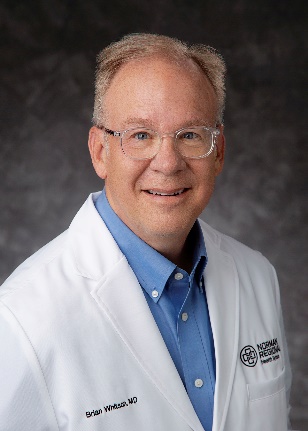Raising Awareness for Lung Cancer and COPD in Oklahoma: Screenings, Prevention and Key Stats
- Category: Educational
- Posted On:

November is Lung Cancer Awareness Month, a crucial time to focus on lung health, especially in Oklahoma, where statistics show significant challenges with lung cancer and chronic obstructive pulmonary disease (COPD). Early screening plays a critical role in detecting these conditions at treatable stages, improving outcomes and saving lives. Norman Regional pulmonologist, Brian Whitson, MD, FCCP, shares insight into how Oklahomans can best fight back in the battle against lung cancer and COPD.
Oklahoma's Alarming Lung Cancer Stats
Lung cancer is a leading cause of cancer deaths in the U.S., yet many people remain unaware of life-saving lung cancer screenings. In fact, only 38% of people in a survey by the American Lung Association had heard of lung cancer screenings, which can detect cancer at an early stage when treatment is more effective.
In Oklahoma, the rate of new lung cancer cases is 63.5 per 100,000, well above the national average of 54.6. Oklahoma ranks 40th in the nation for lung cancer incidence and unfortunately sits in the bottom tiers for early diagnosis, survival, and treatment rates:
- 5-Year Survival Rate: Just 21.2% of people diagnosed with lung cancer in Oklahoma survive five years or longer, lower than the national rate of 26.6%.
- Early Diagnosis Rate: Only 22.7% of lung cancers in Oklahoma are caught early, compared to a national average of 26.6%.
- Surgical Treatment: Just 15.5% of patients in Oklahoma undergo surgery as part of their first treatment, lower than the national rate of 20.8%.
- Lack of Treatment: Oklahoma ranks 40th for untreated cases, with 24.2% of lung cancer patients receiving no treatment, above the national rate of 20.6%.
While these numbers may seem daunting, there have been improvements over the past five years. The survival rate has increased by 20%, early diagnosis by 18%, and the rate of new cases has decreased by 14%.
Norman Regional’s Lung Cancer Screening Services
 At Norman Regional Health System, lung cancer screenings are available at all three hospitals with no referral needed. These low-dose CT scans are quick and painless, designed to find lung nodules that could be cancerous. Dr. Whitson explains that the procedure is both noninvasive and efficient.
At Norman Regional Health System, lung cancer screenings are available at all three hospitals with no referral needed. These low-dose CT scans are quick and painless, designed to find lung nodules that could be cancerous. Dr. Whitson explains that the procedure is both noninvasive and efficient.
“There are no needles or prep involved, and patients are on the table for less than five minutes,” Dr. Whitson shares. “These scans have been available for about 10 years, and we’re trying to ramp up awareness about the program.”
Dr. Whitson recommends that individuals aged 50 and above who currently smoke or quit within the past 15 years consider getting a lung scan. Oklahoma ranks 41st in the nation for lung cancer incidence, yet 45th in screenings, a gap Dr. Whitson and his team aim to close.
For those interested, lung scans are $100 individually or can be combined with a heart scan for $125. Insurance may cover the procedure with a doctor’s referral.
To schedule a scan, visit here or call 405-307-2290.
Related blog: Norman Regional Ramps up Lung Cancer Screenings for Lung Cancer Awareness Month
Causes, Symptoms and Prevention of COPD

![]() COPD is another extremely prevalent and serious lung condition affecting many Oklahomans. The disease causes constriction of airways caused by damaged or clogged lungs, making it difficult to breathe. With an estimated 14 million new cases diagnosed in the U.S. each year, COPD is the sixth overall leading cause of death. COPD, which includes emphysema and chronic bronchitis, has no cure, but symptoms can be managed with proper care.
COPD is another extremely prevalent and serious lung condition affecting many Oklahomans. The disease causes constriction of airways caused by damaged or clogged lungs, making it difficult to breathe. With an estimated 14 million new cases diagnosed in the U.S. each year, COPD is the sixth overall leading cause of death. COPD, which includes emphysema and chronic bronchitis, has no cure, but symptoms can be managed with proper care.
Dr. Whitson emphasizes that quitting smoking is one of the most effective ways to prevent COPD and other lung diseases. “Smoking triggers inflammation, and chronic inflammation damages the lungs,” he explains. “Switching to vaping or marijuana doesn’t help; in fact, it may be even worse for lung health due to less information about their long-term effects.”
In addition to quitting smoking, Dr. Whitson recommends regular exercise, maintaining a healthy weight, and staying current with vaccinations—especially the flu and pneumonia vaccines, which are essential for lung health.
“We lose people every year to preventable diseases like the flu and pneumonia,” Dr. Whitson says. “Taking steps to protect your lungs today can help you live a healthier, fuller life.”
By spreading awareness about these life-saving screenings and taking proactive steps to maintain lung health, Oklahoma can work toward improving these sobering statistics. If you or someone you know may be at risk, consider scheduling a lung cancer screening or discussing preventive steps with a healthcare provider.



.png)